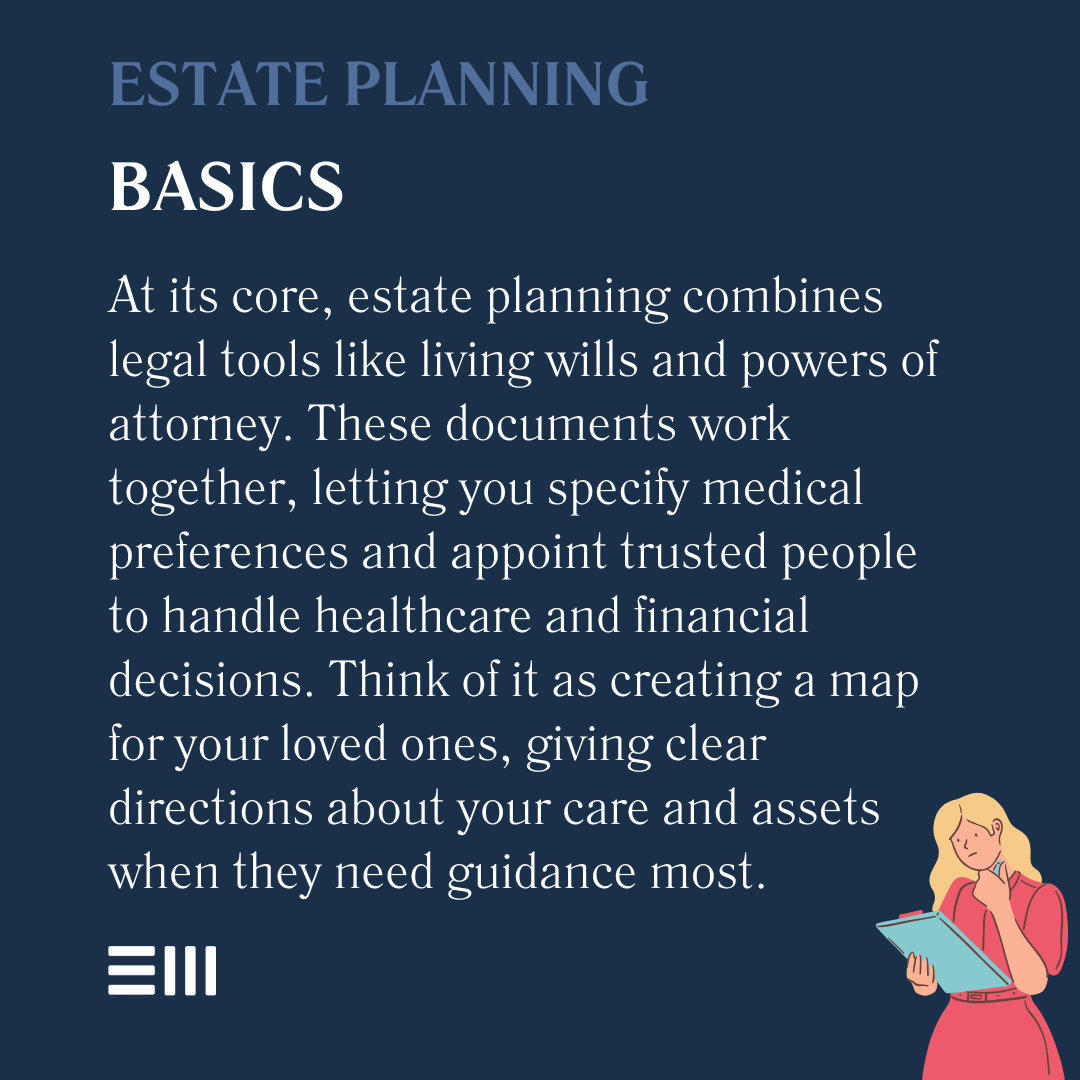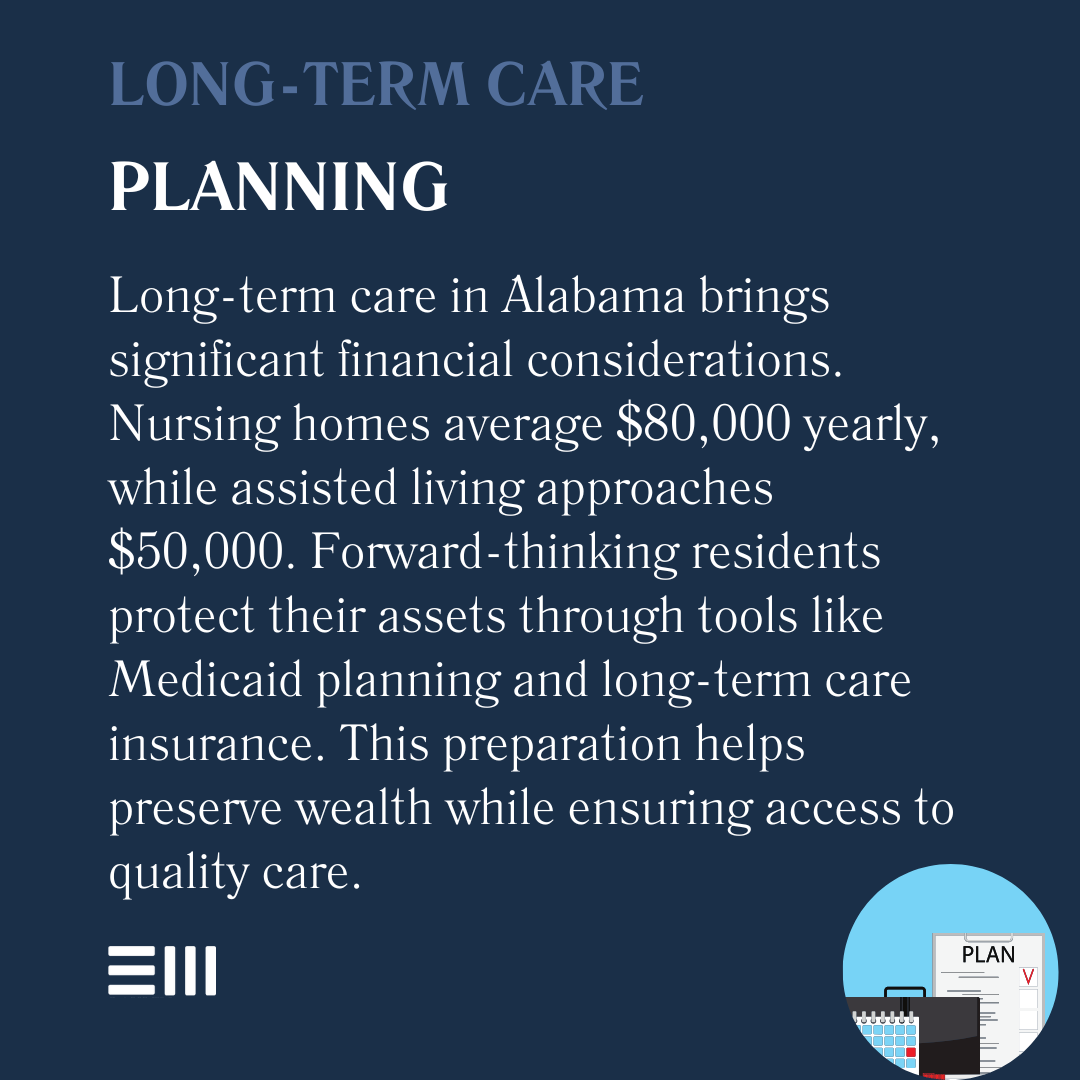Life rarely follows a predictable path. A successful business owner suddenly faces a devastating illness.
A family matriarch begins showing signs of dementia. A tragic accident leaves a parent unable to make medical decisions.
These pivotal moments reshape families and highlight why thoughtful estate planning isn't just about distributing assets—it's about protecting your loved ones and ensuring your wishes are honored when you can no longer speak for yourself.
For Alabama residents, understanding how to integrate estate planning with long-term care considerations provides a crucial safety net for life's uncertainties.
Understanding Estate Planning Basics
The foundation of a solid estate plan requires careful consideration of multiple elements working together.
An effective strategy protects your assets and ensures your healthcare wishes are respected. Let's explore the essential components that form the backbone of any comprehensive estate plan:
Key Components:
- Living wills and advance directives that specify your medical care preferences;
- Durable powers of attorney for financial decisions;
- Healthcare proxies who can make medical decisions on your behalf;
- Trust creation and management for asset protection;
- Comprehensive asset inventory and distribution plans;
- Tax planning strategies to minimize estate tax burden;
- Beneficiary designations for life insurance and retirement accounts;
- Business succession planning if applicable;
- Digital asset management and access provisions; and
- Guardian designations for minor children.
Understanding and implementing these components creates a robust foundation for your estate plan, ensuring your wishes are carried out effectively and efficiently.
Long-term Care Planning Essentials
With nursing home costs in Alabama averaging over $80,000 annually and assisted living facilities approaching $50,000 per year, planning for long-term care requires careful consideration of various factors. Below are the key elements to consider when developing your long-term care strategy:
Essential Considerations:
- Medicaid eligibility requirements and asset limits;
- Long-term care insurance options and policy features;
- Asset protection trust structures and benefits;
- Medicare coverage limitations and supplemental insurance;
- In-home care alternatives and cost comparisons;
- Family caregiver support systems and resources;
- Veterans benefits and eligibility criteria;
- Reverse mortgage possibilities;
- Income planning for long-term care expenses; and
- Community-based care programs.
By carefully evaluating these factors and implementing appropriate strategies, you can better prepare for potential long-term care needs while protecting your assets.
Estate Planning Tools and Strategies
Different legal instruments serve unique purposes in estate planning. Here's a breakdown of the most important tools at your disposal:
Revocable Living Trusts:
- Avoid probate process;
- Maintain privacy;
- Provide flexibility;
- Enable smooth asset transition; and
- Allow for incapacity planning.
These living trusts offer flexibility while maintaining control over your assets during your lifetime.
Irrevocable Trusts:
- Asset protection benefits;
- Tax advantages;
- Medicaid planning opportunities;
- Special needs planning; and
- Charitable giving options.
These permanent arrangements provide strong asset protection and tax benefits when structured properly.
Powers of Attorney:
- Financial decisions;
- Healthcare choices;
- Property management;
- Business operations; and
- Tax matters.
Having these documents in place ensures your affairs can be managed if you become incapacitated.
Alabama Estate Planning and Long-term Care Questions
Planning for the future often raises important questions about Alabama estate planning and long-term care.
Here are detailed answers to the most common concerns we encounter.
How Early Should I Start Estate Planning?
Estate planning should begin as soon as you acquire significant assets or have dependents. Regular updates ensure your plan remains current with life changes, tax law modifications, and evolving family dynamics.
What Assets Should Be Included in My Estate Plan?
A comprehensive estate plan should account for all your assets and possessions. Here's what you should consider including:
- Real estate holdings and property rights;
- Financial accounts and investments;
- Business interests and partnerships;
- Personal property and collections;
- Life insurance policies and benefits;
- Retirement accounts and pensions;
- Digital assets and cryptocurrencies;
- Intellectual property rights;
- Future inheritances; and
- Personal loans and debts.
Taking inventory of these assets helps ensure nothing is overlooked in your estate plan.
How Does Medicaid Planning Affect My Estate?
Proper Medicaid planning requires careful attention to several key factors:
- Five-year look-back period implications;
- Asset transfer restrictions;
- Income limits and spend-down requirements;
- Exempt asset categories;
- Spousal impoverishment protections;
- Estate recovery programs; and
- Trust planning strategies.
Understanding these elements helps protect your assets while maintaining eligibility for benefits.
What Role Do Trusts Play in Long-term Care Planning?
Trusts are powerful tools in long-term care planning. Here are their key functions:
- Asset protection from creditors;
- Medicaid qualification strategy;
- Tax efficiency planning;
- Special needs provisions;
- Spendthrift protections;
- Healthcare cost management; and
- Legacy preservation.
These trust features can be combined to create a comprehensive long-term care strategy.
Secure Your Future Today
Your legacy and long-term care needs deserve careful planning and professional guidance.
Our experienced team understands Alabama's complex estate planning laws and can help create a comprehensive strategy tailored to your unique situation.
Contact us today for a confidential consultation and take control of your future planning needs.
Don't leave your future to chance. Schedule a consultation with our estate planning experts today, and let us help you create a robust plan that protects your assets and ensures your wishes are honored.


